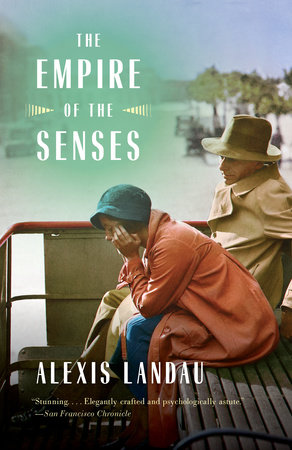The Empire of the Senses Reader’s Guide
By Alexis Landau


1. Discuss the title. What does it mean to you?
2. Many of the Jewish characters in the book were secular Jews, persecuted for their race. What is the role of religion in the story? Can a system of political beliefs be considered a religion?
3. Although the story of the Perlmutter family is fiction, many aspects of the novel are historically accurate. What did you learn from this account? Do you have events that occurred in your own family’s past that you can relate?
4. Initially, Lev and Josephine seemed to genuinely love each other. Neither were particularly religious, and Josephine didn’t feel her family’s dislike of Lev’s background (and Lev himself) as a hardship. Would they have continued to love each other if not for the war? Would they have stayed together, if not for the war?
5. Describe the character of Leah, particularly as opposed to Josephine? How are they different? Are there similarities between the two women?
6. Do you think Lev and Leah would have continued to love each other, and as intensely, if they had been able to be together?
7. Lev is a deserter from the army. When he signed up for the Army, he deserted his family, in a way. How did he desert Josephine? How did he desert Leah? Did Franz desert his Jewishness? Did Vicky desert her relationship with her mother? What other forms of desertion, emotional and physical, occur in the book, and what other words would you use in place of “desertion”?
8. Friday, June 10, 1927: The author recounts this day several times to from the point-of-view of each character. What do you learn about the individual family members as they move through his/her day?
9. Vicky is a teenager, eager to assert her independence and individuality. What are the confinements she feels? How does she react to them? What does she embrace?
10. Franz, too, is trying to find himself. What does he need to do to assert himself? What new ideals does he embrace?
11. The Perlmutters are a family, although four incredibly different people. Do they seem ambivalent to one another? They seem to react very strongly to each other, but not to come closer together. How does the core (or lack thereof) of this family affect them so deeply? Can the war be blamed for these negative connections?
12. Josephine is an ever-evolving character. Describe her relationship with Dr. Dührkoop. How does the introduction of Herr K change what begins as a clinical arrangement? How does her newfound liaison change her? Where does the interest in mysticism and death fit it? Do you think Josephine is trying too hard to live in the past, or is she focused on her future?
13. What happens to the relationship between Josephine and Lev?
14. Discuss the character of Otto. He appears in the two separates sections of Lev’s life, the two separate sections of the story. What role does he play in the novel?
15. Vicky has much in common with her father. How is her love with Geza similar to his love with Leah? How does this love change Vicky? What do you think makes this love work, through all of its hardships? What do Vicky and Geza have that Lev and Leah did not?
16. Franz grew up with Lev as his hero. What changed? How does Franz’s behavior as a teenager reflect that change? Franz loved soldiers and Franz had a crush on Wolf. If Franz had shared the truth about his sexuality with anyone in his family, do you think he would have become so involved with the Nazis? So anti-Semitic? How are the feelings toward Franz’s father, soldiers/heroes, and Wolf bound together for him?
17. Describe the incident at Nuremburg. How did it affect the three Perlmutters differently? Why were there reactions so different? How would Franz have reacted, if he were there?
18. If Franz and Vicky had been closer, what would have changed for the two?
19. In certain key respects, Franz’s family didn’t know him. Is he a sympathetic character, despite what he has done?
20. What about Josephine? She was left behind during the hardships of war, deserted in her marriage, lost and left alone by her mother’s death, and poorly dealt with by her psychologist. Does she deserve sympathy?
21. In the end, Lev is alone. But, as throughout the story, he doesn’t seem to feel it. Does Lev deserve his solitude? Is it a hardship? How do you feel about him as a protagonist?